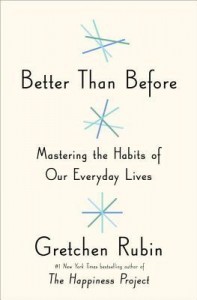Better Than Before, the title of Gretchen Rubin’s book about how habits are set and changed, was reason enough to like the concept before I even read a page. Rubin didn’t call the book You’re Perfect Now or Get Control of Your Life. She implied with Better Than Before that her only aim was to provide tools that could help readers make some improvements. I think she succeeds in that goal.
Rubin, author of The Happiness Project, has a writing style that lends itself well to unpacking research and delivering it to the reader in an entertaining and compelling way. She tells stories about herself and others to demonstrate her main point: To change a habit you must know yourself. It doesn’t matter, for example, if studies show that morning exercise has important benefits. If you are truly not a morning person, then trying to get yourself to exercise in the morning will probably be futile. Figure out when you’re most likely to workout and build the habit around that time.
In the first part of the book, Rubin sets out to help readers identify themselves in four personality types that she herself developed as a result of her research. She says there are Upholders (those who strive to meet both outer and inner expectations); Questioners (those who resist outer expectations, but will meet inner expectations); Obligers (those who will meet outer expectations, but will resist inner expectations); and Rebels (those who resist both outer and inner expectations).
Reading about the four types and how each one responds to expectations made me see easily that I am an Obliger. I would never miss a deadline or shirk an obligation I’ve committed to (in most cases), but I have a hard time keeping promises to myself about finishing a certain piece of writing that is not expected by any particular editor, eating less sugar, walking more, and going to sleep earlier.
Once you know your type, you can read the rest of Better Than Before with your own abilities and limitations in mind. Rubin doesn’t intend for the reader to change personalities. Rather, her aim is to help each type of person know how to make improvements within the confines of how we are wired. I found this one-size-does-not-fit-all approach so useful and original.
Another refreshing point that Rubin repeats often (and it’s necessary) is that habits are not about self-control. If you have a good habit established, then the decision is already made. You don’t need to rely on will power and self-control because the behavior is automatic. I’ve experienced that with training myself to wake up at 5AM to write on weekdays. There’s no negotiating with myself at night and no fighting the alarm in the morning. I made the decision over a year ago that working in the morning was the only way I would have enough time, and I learned to love that quiet hour and then some so much that the joy of it supersedes the sleepiness I feel the moment I hear the buzz of the alarm. However, considering my Obliger personality type, I realize now that part of my success in establishing this habit was my promise to my husband, who wants to sleep later, that I would not press snooze. By making sure Bryan gets his sleep, I give myself my full writing session. Now if I could just get Bryan to go to bed earlier so that I could be externally motivated to do the same. I really need more sleep!
Better Than Before is full of useful, interesting research told in Rubin’s easy-to-read style. I highly recommend it for people who like to know themselves better and of course for people who’d like to establish a new good habit or two.
Latest posts by Nina Badzin (see all)
- #149 – June Friendship Challenge: Ask a Friend For a Favor - June 1, 2025
- #148 – Tricky Friendship Etiquette for the Modern Age - May 26, 2025
- Dear Nina on NPR - May 24, 2025
- #147 – Share Good News With Your Friends - May 20, 2025


